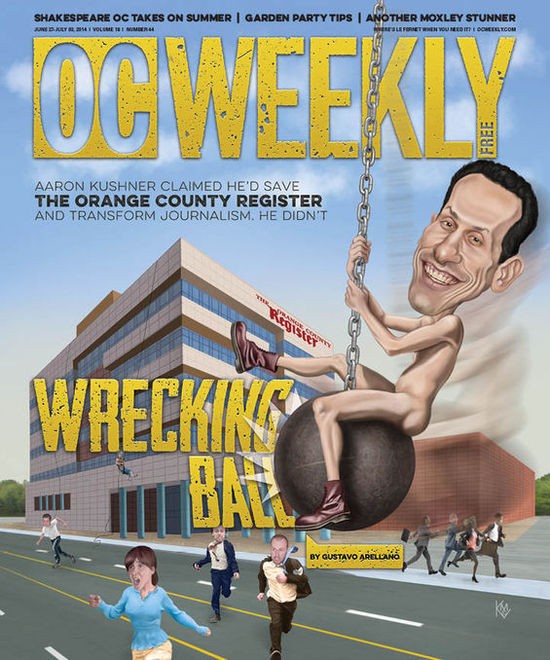
The last thing Rich Mirman expected to do when he became the new publisher of the Orange County Register on Oct. 13 was to deliver newspapers–but he had no other choice. The daily was in a state of chaos, the grand journalism dreams of Register owner Aaron Kushner in shambles. Tens of thousands of subscribers hadn't received their paper for more than a week, the result of Kushner switching delivery companies after the Los Angeles Times claimed he owed them at least $2.5 million in unpaid delivery bills. That fiasco came just weeks after Kushner sold off the paper's longtime Grand Avenue offices, shut down the Los Angeles Register, and laid off about 30 reporters and editors–the second mass cutting in the newsroom this year alone. Irate phone calls and emails kept flooding the Register, with cancellations numbering in the thousands.
]
Mirman arrived at the Register's printing plant his first weekend on the job at 2 a.m., folding papers alongside his wife. After stacking hundreds of papers into a car, he and another Register worker drove to Huntington Beach at 3:30, with Mirman tossing papers out of the passenger window. Once the sun rose, the 48-year-old began knocking on doors and personally delivering the paper, apologizing to startled subscribers for any delays.
“I didn't do it for publicity,” says Mirman, eating a vegetarian taco at Taquería Zamora in Santa Ana and washing it down with a frosted glass of mineral water. “But I thought everyone should pitch in. I couldn't ask other [Register employees] to do it without me being the first one out there.”
In just a month on the job, Mirman has already proven himself the anti-Kushner. Whereas Kushner projects a detached arrogance, Mirman comes across as forthright: honest about his company's shortcomings, but ready to do whatever it takes to make things right. Quick to smile and an attentive listener, Mirman is being asked to save the Register from its death spiral despite having no journalism experience, a job for which he says he's more than ready.
“My goal is not to change the position of the Register,” he says with a big grin. “We just need to strengthen the fundamentals.”
And the big fundamental for Mirman? Not journalism so much as subscribers.
Born in Rochester, New York, but raised in Urbana, Illinois, Mirman first made a name for himself in the early 2000s as an executive with Harrah's Entertainment. As immortalized in Wall Street Journal reporter Christina Binkley's excellent 2009 book, Winner Takes All: Steve Wynn, Kirk Kerkorian, Gary Loveman, and the Race to Own Las Vegas, Mirman and other Harrah's executives were initially derided by competitors as “propeller heads”: naive outsiders with no idea of the gaming industry (Mirman has bachelor's and master's degrees in mathematics). But under Mirman's influence, Harrah's launched a loyalty program called Total Rewards that revolutionized casinos by tracking the spending habits of the hoi polloi rather than just the high-rollers; all the data gathered, in turn, allowed Harrah's to craft specific incentives for gamblers to stick with the company. Critics ridiculed Mirman and Harrah's formulas and data sheets, but they had the last laugh: In 2005, Harrah's merged with Caesars Entertainment, creating the largest gambling company on Earth.
But even then, Mirman was happy to do the dirty work. “One year, our workers walked off the job [in Atlantic City] during a labor dispute,” Mirman remembers. “I ended up cleaning toilets for two weeks–you do what you need to do. But we settled with the union, and everything was fixed.”
Mirman stepped down in 2007, troubled by what he felt was an increasingly corporatized culture at Harrah's. “It's always better to be the underdog,” Mirman says. “When you're on top, things change.” He left to start his own consulting company and became acquainted with Register co-owner Eric Spitz through a mutual friend. Spitz and Kushner were so impressed with Mirman's Vegas accomplishments that they hired him to consult on their circulation department in 2013. That same year, Kushner decided to buy the Riverside Press-Enterprise but needed investors; Mirman put in an undisclosed amount of his own cash.
“I liked the financials, and I thought at the time that it had a lot of potential,” he says. “I like industries that have all the fundamentals for growth but have not filled their potentials–and journalism is that opportunity. It's got some real strong fundamentals.”
Asked if he regretted investing in the Register, Mirman shakes his head. “I don't regret it at all,” he says. “The game hasn't played out–we have a lot more innings.”
[

This September, according to Mirman, Kushner and Spitz asked him if he wanted to become publisher of the Register since “Aaron felt he was being pulled in too many directions,” dismissing rumors that Kushner was deposed by other investors for the delivery fiasco.
Mirman is already making his presence felt–and not just by delivering papers. He asked reporters to volunteer an hour a week to call miffed subscribers and offered $150 VISA gift cards to employees for delivering the paper–initiatives, he claims, that were created at the behest of employees but that have been derided nationwide. He shuttered OC Metro, a 24-year-old magazine that Kushner had acquired in 2012, for the simple reason that “it wasn't profitable.” Its last issue was Nov. 17.
“The goal is not to lay people off,” Mirman says, “but to reprioritize them. The company has to be focused on being profitable. Being unprofitable doesn't help anyone.”
More than anything, Mirman stresses, the Register must focus on pleasing the customer and the customer alone. He places particular emphasis on Register Connect, a program that, much like Total Rewards, gifts Register readers for their loyalty with tickets to events and special parties.
“I want to build on this connection that we have between customers and advertisers,” Mirman says. “We need to get back to the fundamentals of what we do for a living–acquiring and retaining subscribers–and rebuild our focus in the community and on doing good.”
He won't comment on the multiple lawsuits the paper currently faces (ranging from unpaid rent to jilted investors to the Times suing for unpaid bills), the paper's current financial status, or Kushner or Spitz, other than to say he feels the Register was doing “some opportunities that we shouldn't be doing”–namely unprofitable ones. But he does stand by editor Rob Curley, a Kushner favorite Mirman says is doing a “great” job. And Mirman also believes “digital is the important part of what we're doing going forward”–a direct repudiation of Kushner's controversial print-first strategy. “I'm trying to understand who our readers are and what they need from us.”
Mirman–who plans to move to Orange County next year after his son graduates from high school–welcomes skepticism that a casino guy can save the Register. “It was exactly the same issue in the gaming industry,” he says. “Even to this day, [critics] still don't think we knew what the heck we were doing. But within six months, we knew what we were doing; in the nine years afterward, it was all execution. And a $1 billion company turned into a $10 billion company.”
Mirman will be delivering papers again this weekend.
Follow OC Weekly on Twitter @ocweekly or on Facebook!

